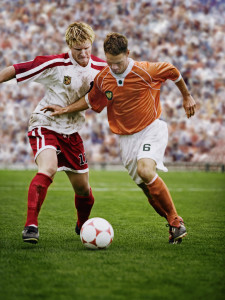A New Primary Goal When You Compete
posted on: May 20, 2014
author: Brian Lomax, Ed.D.
If you play a sport in which you or your team has a direct opponent that you are competing against (football, basketball, soccer, hockey, tennis, etc.), what is your primary goal when you start playing? Is it to win? Is it to execute your game plan or do your job? Is it to play well? Perhaps it’s something else? These are all valid perspectives, but let me give you a new one to consider. One that may make you re-examine your other perspectives and how you actually perform them.
Your primary goal when you compete is to break your opponent mentally. Yes, you read that correctly. I want you to focus on breaking your opponent mentally. Everything you do should be with this goal in mind. Your game plan, how you attack your opponent, how you manage your body language and self talk, your confidence, etc. – all of these things must contribute to the breaking of your opponent. This is the ultimate lesson in becoming a great competitor and once you do it for the first time, you’ll realize that you’ve moved to a new level of competitor. It is the pinnacle of competition.
To some of you, this may sound a little cruel, but the fact of the matter is you’re more or less doing this already, you’re just not as focused on it as you should be. And you’re not looking for the signs of it happening enough either, for if you were, you wouldn’t be making some of the mistakes that you’re making today that allow your opponents to stay in the game or match longer than they should. Why do we focus on this? Because when your opponent breaks mentally, they make more mistakes and they quit competing. Essentially, they make it easier for you to win because they are overwhelmed.
So how do you break your opponents mentally? There are a couple of ways that I want to highlight. First is pressure. Your game plan or your style of play must somehow exert pressure on your opponent. It must make them uncomfortable in some way. It must take them out of their game and put them in your game. When competitors feel pressure, they can start to make poor decisions. They may try to do things that they can’t really do well because their normal game has no answer for what you are doing to them. I want you to examine your style of play or your game plan and really understand how it is putting pressure on the opponent. What about it makes them uncomfortable? If you’re not making opponents uncomfortable, you’re not going to be successful.
Second is own the critical moments. In a previous blog post, I wrote about how to succeed in the critical moments, and the more you do this, the more your opponent is going to break. They are going to be frustrated and angry, and that will give you the advantage. I see this in tennis all the time. If one player is winning more of the deuce games in a match, that eventually gets into the opponent’s head.
The last method is somewhat related to the first and it is that you try to break your opponent’s physical conditioning. Nothing breaks the will to compete like fatigue, and if you can exhaust your opponent, they’ll start making mistakes and they’ll check out mentally. Early on in the competition, show your opponent how hard they are going to have to work today to earn the victory, and you may find that they aren’t up for it. The physical exhaustion will lead to mental fatigue and that will lead to you coming out on top.
Once you start to compete with this goal in mind, you must also be observant of the signs of a mentally breaking opponent: anger, frustration, complaining, arguing, bad body language, low energy, lack of effort, poor decision making, etc. When you see these behaviors, don’t let them upset you. Be happy about it. This is exactly what you want and once you start seeing some of these things, it’s your job to make sure your opponent keeps acting this way. Don’t do anything that might reinstate their confidence or help them to get back in the fight.
Before we conclude, let’s discuss some things that you should not do to break your opponents mentally: cheating, taunting, intimidation, deliberate confrontation, and other unethical means. These are not the methods of great competitors. They are for cowards and for people who don’t have the courage to put their abilities on the line. Winning through these methods is an empty experience and will never be completely fulfilling, so don’t use them when trying to break your opponent mentally.
How you use your game, your strategy, your conditioning, your body language and your thoughts is plenty when it comes to breaking your opponent mentally. This concept has had a tremendous impact on my ability to compete and has helped me find more and more opportunities to break my opponent. Experiment with this perspective and let me know how it works for you.
About the Author
Dr. Brian Lomax founded PerformanceXtra™ in 2009 with a mission of helping athletes achieve their goals and their top performances more consistently through a progression of mental skills that enables them to focus on what is truly important.
Learn more about the author: https://performancextra.com/brian-lomax/


This is a great article and very true! It was good that you outlined the appropriate ways to break down an opponent vs. the inappropriate approach.
Thanks, Steffani, for your response. Yes, expressed in an inappropriate way can cause a lot of hard feelings and a lot of collateral damage.